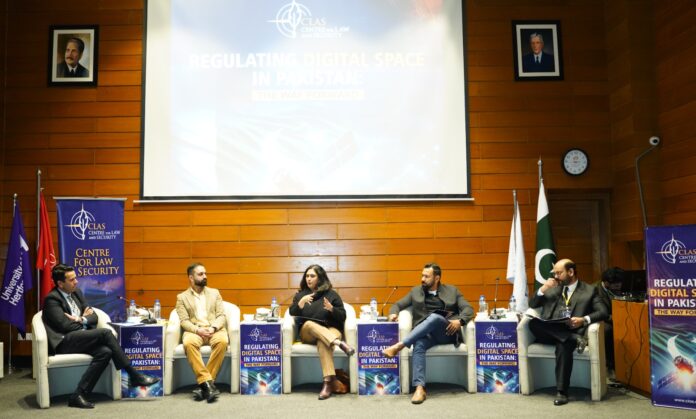ISLAMABAD: Centre for Law and Security (CLAS) hosted a panel discussion on ‘Regulating Digital Space in Pakistan: The Way Forward’ at TMUC, Islamabad.
The event brought together prominent experts and practitioners to deliberate on the critical need to regulate Pakistan’s digital space in alignment with contemporary global and local challenges. Sardar Masood Khan, Former President of AJK was the Chief Guest at the event. The event was attended by a large number of students and faculty members.
Sadaf Khan, Co-founder of Media Matters for Democracy, focused on the importance of meaningful digital access and literacy. She highlighted the need for a multi-stakeholder approach to policymaking and pointed out the gaps in addressing cybercrime and AI regulation at the local level. She also stressed fostering awareness of the advantages and risks of digital tools as essential to societal progress.
Usama Khilji, digital rights activist and Director of Bolo Bhi, discussed the concept of national interest and its implications for digital rights. He underscored the need for a constitutionally grounded approach to freedom of speech and internet regulation, proposing the recognition of the internet as a fundamental right. He called for safeguarding citizens’ rights and how internet shutdowns disproportionately affect the public and freelancers.
Yawar Siddique, Co-founder of RepStack and RepStack Learning Academy, highlighted the economic implications of internet disruptions. He emphasized the critical role freelancers and entrepreneurs play in Pakistan’s economy, contributing nearly 60% of the country’s dollar income. While acknowledging challenges in replicating international models like China’s, he stressed the need to foster a supportive ecosystem for Pakistan’s digital workforce and advocated against internet shutdowns.
Sheikh Waqas Bin Aamir, Advocate Islamabad High Court and Head of the Law Program at The Millennium Universal College, emphasized the importance of societal adaptation to technological advancements. He called for a phased approach to policy implementation, beginning with collaboration among think tanks, academic institutions, media, and tech industries, and extending to national policy frameworks.
Rehman Azhar, Director of CLAS, moderated the session, highlighting the significance of digital space regulation as a cornerstone of modern statecraft. He emphasized the importance of managing digital platforms to contribute effectively to Pakistan’s prosperity.
Ambassador Masood Khan, President of CLAS, delivered the concluding remarks. He praised the panelists for their insightful contributions and highlighted Pakistan’s untapped potential in the technology sector. He noted that Pakistan is home to many freelancers globally, with over 143 million broadband users and a population exceeding 60% with internet access. Ambassador Khan expressed optimism about Pakistan’s digital and technological future, urging the development of robust policies to harness the country’s youth potential and align with global technological trends.
The event underscored the urgency of addressing digital space regulation through inclusive, collaborative efforts of academia and industry, ensuring a prosperous and connected future for Pakistan.

